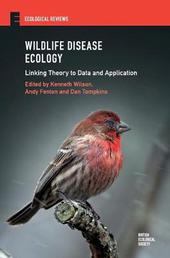
|
Wildlife Disease Ecology: Linking Theory to Data and Application
Hardback
Main Details
| Title |
Wildlife Disease Ecology: Linking Theory to Data and Application
|
| Authors and Contributors |
Edited by Kenneth Wilson
|
|
Edited by Andy Fenton
|
|
Edited by Dan Tompkins
|
| Series | Ecological Reviews |
|---|
| Physical Properties |
| Format:Hardback | | Pages:690 | | Dimensions(mm): Height 252,Width 180 |
|
| ISBN/Barcode |
9781107136564
|
| Classifications | Dewey:571.98 |
|---|
| Audience | | Professional & Vocational | |
|---|
| Illustrations |
61 Halftones, black and white; 223 Line drawings, black and white
|
|
Publishing Details |
| Publisher |
Cambridge University Press
|
| Imprint |
Cambridge University Press
|
| Publication Date |
14 November 2019 |
| Publication Country |
United Kingdom
|
Description
Just like humans, animals and plants suffer from infectious diseases, which can critically threaten biodiversity. This book describes key studies that have driven our understanding of the ecology and evolution of wildlife diseases. Each chapter introduces the host and disease, and explains how that system has aided our general understanding of the evolution and spread of wildlife diseases, through the development and testing of important epidemiological and evolutionary theories. Questions addressed include: How do hosts and parasites co-evolve? What determines how fast a disease spreads through a population? How do co-infecting parasites interact? Why do hosts vary in parasite burden? Which factors determine parasite virulence and host resistance? How do parasites influence the spread of invasive species? How do we control infectious diseases in wildlife? This book will provide a valuable introduction to students new to the topic, and novel insights to researchers, professionals and policymakers working in the field.
Author Biography
Kenneth Wilson is Professor of Evolutionary Ecology at Lancaster University. With more than twenty-five years' experience in studying wildlife disease ecology, he has published more than 120 peer reviewed articles and chapters, and is Senior Editor of the Journal of Animal Ecology. Andy Fenton is Professor of Theoretical Ecology at the University of Liverpool. He is on the Editorial Board of the Journal of Animal Ecology and Parasitology and has published more than eighty peer reviewed papers. Dan Tompkins is Project Manager Science Strategy at Predator Free 2050 Ltd, Auckland, and Honorary Professor in the Department of Zoology, University of Otago, New Zealand.
Reviews'Overall, this is a fascinating collection of studies that showcases why wildlife diseases are worthy of study and how combining field observations, experiments, mathematical models and the latest in genomic and molecular research provides not only research insight, but also contributes to effective conservation and management efforts.' Rob Robinson, British Trust for Ornithology 'Advances in modeling, epidemiologic techniques, and genetics have been crucial in some examples treated by contributors, and the importance of long-term field studies, essential for understanding dynamic systems, is emphasized throughout the volume. Some studies are observational, some experimental, and some largely theoretical. All contributions are extensively referenced and effectively illustrated.' M. Gochfeld, Choice 'Overall, this well-written book is, in my opinion, a valuable contribution that will encourage further collecting and analysing long-term data in the study of wildlife diseases. It also gives hope. The advances in our understanding of wildlife disease dynamics enable better planning of conservation and management efforts, as shown in the case of wild and farmed salmon or the bighorn sheep pneumonia. As such, it is undoubtedly of high value for researchers and managers working in the field of wildlife disease ecology, but also for advanced undergraduate students or academic lecturers who would like to broaden their knowledge. The book was a great company during the coronavirus lockdown and a fascinating journey through the realm of wildlife diseases. I highly recommend it!' Agata Mrugala, Basic and Applied Ecology 'This book comes to fill an important niche in disease ecology: synthesizing the state of knowledge about wildlife disease ecology while integrating theoretical models with a wide variety empirical case studies ... this book presents an invaluable synthesis of our knowledge of disease ecology in wildlife hosts.' Miguel A. Acevedo, The Quarterly Review of Biology
|